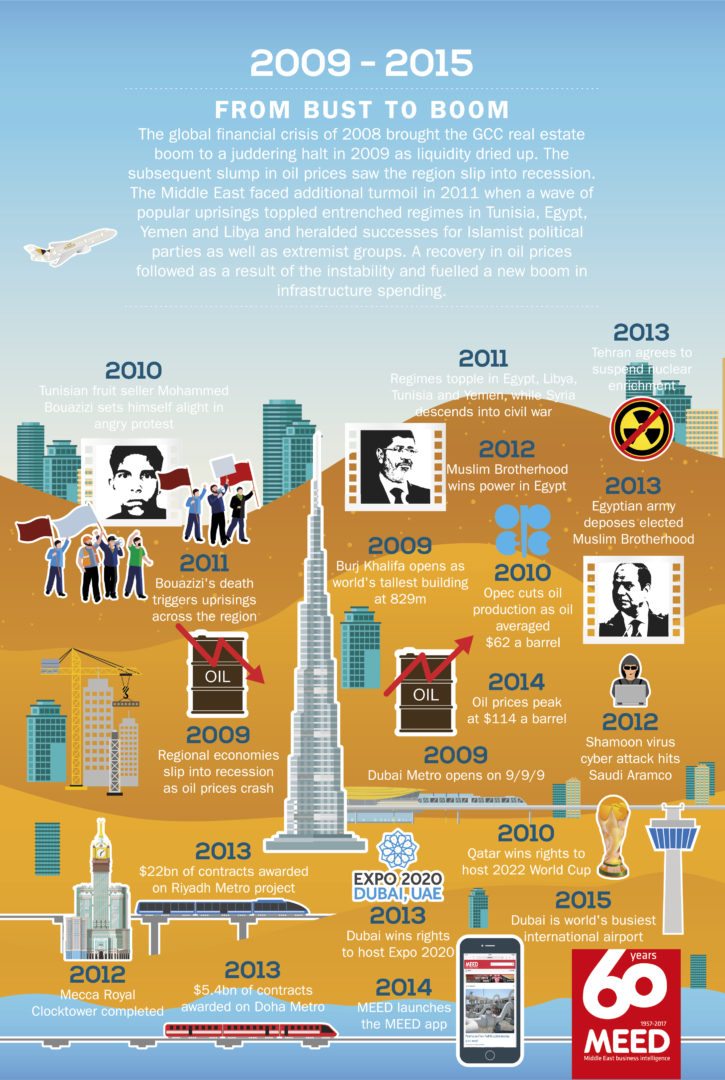

The global financial crisis of 2008 brought the GCC real estate boom to a juddering halt in 2009 as liquidity dried up. The subsequent slump in oil prices saw the region slip into recession. The Middle East faced additional turmoil in 2011, when a wave of popular uprisings toppled entrenched regimes in Tunisia, Egypt, Yemen and Libya, and heralded successes for Islamist political parties as well as extremist groups. A recovery in oil prices followed as a result of the instability and fuelled a new boom in infrastructure spending

MEED 2009-2015 infographic
MEED 2009-2015 infographic
For almost six years, from 2003-08, a wave of liquidity washed over the Middle East, created by high oil prices, record levels of oil production and the global credit boom.
Across the GCC, investors and governments ploughed money into huge real estate, infrastructure, petrochemicals and other industrial developments. Dubai, in particular, borrowed heavily to drive a real estate boom that, at its peak, accounted for 65 per cent of the entire GCC projects market.
But what goes up must come down, and the global financial crisis of 2008 brought the GCC real estate boom to a juddering halt in 2009 as liquidity dried up. Dubai teetered on bankruptcy and a slump in oil prices saw the region slip into recession.
The Middle East entered a dark new period in December 2010, when Tunisian fruit seller Mohammed Bouazizi set himself alight in the town of Sidi Bouzid, consumed with anger at the harshness of his treatment by the authorities. Bouazizis death in January 2011 triggered an uprising in Tunisia that spread across the region and toppled entrenched regimes in Tunisia, Egypt, Yemen and Libya.
Initially celebrated as a revolution that had brought an end to decades of authoritarian dictatorships, the uprisings became known as the Arab Spring. But it soon became clear that their primary achievement was to remove the shackles on previously suppressed Islamist political parties, such as Egypts Muslim Brotherhood, and create fertile recruitment grounds for extremist groups including Al-Qaeda and Islamic State in Iraq and Syria.
In 2012, the Muslim Brotherhood won Egypts presidential election and Mohammed Mursi became president. Islamic groups waged war against the governments of Syria, Iraq and each other. A coup to remove Mursi ultimately established former army head Abdul Fattah al-Sisi as Egypts president and a crackdown on opposition began. Syria, meanwhile, continued to disintegrate.
In the GCC, however, the good times had returned. The fear of oil shortages due to turmoil in markets such as Libya and Iraq fuelled a strong recovery in demand. From 2011, record surpluses enabled GCC oil producers to continue spending heavily on huge infrastructure projects. But far away, the surge in oil prices was also providing a boon for US oil shale producers.
You might also like...

Rainmaking in the world economy
19 April 2024

Oman receives Madha industrial city tender prices
19 April 2024

Neom seeks to raise funds in $1.3bn sukuk sale
19 April 2024

Saudi firm advances Neutral Zone real estate plans
19 April 2024
A MEED Subscription...
Subscribe or upgrade your current MEED.com package to support your strategic planning with the MENA region’s best source of business information. Proceed to our online shop below to find out more about the features in each package.








